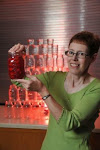Update on Energy Drinks
With urging from some U.S. Senators, the Food and Drug Administration (FDA) is considering possible actions to regulate energy drinks. Following is a summary of resources and information to update the article on energy drinks that appeared in our Nutrition for Family Living e-newsletter in October, 2008 (http://www.uwex.edu/ces/wnep/specialist/nfl/mmpdfs/0810.pdf).
• Bub and Shelnutt from the University of Florida Extension have written an informative fact sheet on “Facts about energy drinks” FCS80017. The fact sheet is available online at http://edis.ifas.ufl.edu/pdffiles/FY/FY132400.pdf
• The American Medical Association has a “Patient Page” handout on energy drinks that contains expert advice and a detailed table of the caffeine content of various brands. http://jama.jamanetwork.com/article.aspx?articleid=1487122
• The American Academy of Pediatrics (AAP) published a clinical report on sports and energy drinks for children and adolescents in 2011. The report has information on the various ingredients and proper usage of these products. The abstract includes the following guidance for pediatricians: “…stimulant substances contained in energy drinks have no place in the diet of children and adolescents. Furthermore, frequent or excessive intake of caloric sports drinks can substantially increase the risk for overweight or obesity in children and adolescents.” Source: http://pediatrics.aappublications.org/content/early/2011/05/25/peds.2011-0965.full.pdf+html
• KL Blankson and others published a review and recommendations on “Energy drinks: What teenagers (and their doctors) should know” in February of this year. (Pediatr Rev 2013;34:55-62). According to this latest report, energy drinks have been aggressively marketed to adolescents who need better education on this topic. The report states that caffeine use is associated with health effects such as palpitations, anxiety, insomnia, digestive problems, elevated blood pressure, and dehydration. Popular brands have the equivalent of 2-3 cups of coffee but few of the products disclose caffeine content on the labels. Energy drinks are often marketed as supplements, which reduces the Food and Drug Administration’s ability to regulate their content and use.
• A scholarly review of research on the potential toxicity of energy/sports drinks was published in April, 2012 by Wolk and colleagues from the University of Massachusetts. Abstract link: http://www.ncbi.nlm.nih.gov/pubmed/22426157
• The American Beverage Association now recommends that energy drink companies state on the label exactly how much caffeine is contained in each drink, and that the beverage is not recommended for children, pregnant or nursing women and people who are sensitive to caffeine (source: http://www.ameribev.org/files/339_Energy%20Drink%20Guidelines%20(final).pdf)
By Susan Nitzke, UW-Extension Nutrition Specialist and UW-Madison Professor Emeritus




No comments:
Post a Comment